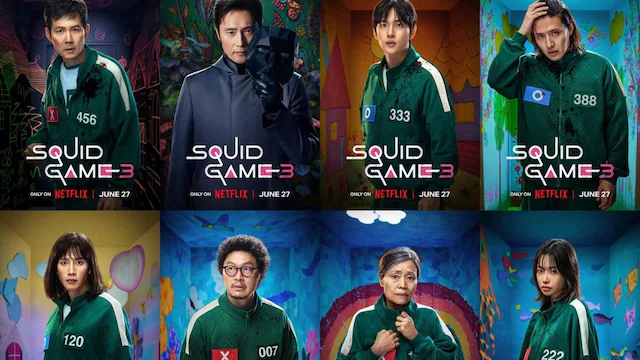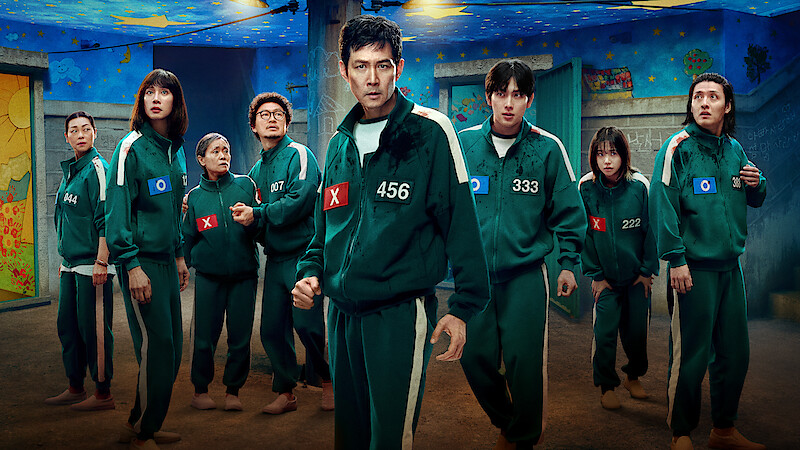So here we are. After what feels like an eternity of waiting, theorizing, and emotionally preparing ourselves, Squid Game Season 3 just dropped on Netflix on June 27, 2025, and honestly? I'm sitting here with my laptop open, cursor blinking, trying to figure out how to even begin processing what we've just witnessed.
If you're like me and you've been on this wild, heartbreaking journey since 2021, you know that Squid Game isn't just another survival thriller. It's become this cultural phenomenon that somehow managed to hold up a mirror to society while simultaneously giving us nightmares about playground games. And now, with the final season here, we're forced to say goodbye to Gi-hun's story – and trust me, it's hitting different than I expected.

What Makes This Final Season So Different
Look, I went into Season 3 expecting more of the same – brutal games, impossible choices, and that sick feeling in your stomach when you realize you're somehow rooting for people to survive children's games turned deadly. But what I found was something deeper, something that feels like creator Hwang Dong-hyuk really understood what this story needed to be about in its final chapter.
The season doesn't just focus on the games anymore. Sure, they're there – and they're as twisted as ever – but this time, it's really about breaking cycles. Gi-hun's journey from traumatized survivor to someone seeking justice (or is it revenge?) feels so much more personal this time around. Lee Jung-jae's performance hits you right in the chest because you can see every moment of pain from the previous seasons etched into his face.
The Front Man Showdown We've Been Waiting For
Can we talk about that final confrontation between Gi-hun and the Front Man? Without spoiling anything, I'll just say this: if you thought you knew where this story was heading, think again. The way the series handles the ultimate face-off between these two characters is both satisfying and heartbreaking in ways I didn't expect.
Lee Byung-hun's portrayal of the Front Man in this final season adds layers we haven't seen before. There's something almost tragic about watching these two worlds collide – Gi-hun's desperate need for justice and the Front Man's cold, calculated control. The fierce clash between their two worlds becomes the emotional core of the entire season.
Why This Ending Actually Works
Here's the thing about endings – they're hard. Really hard. Especially when you're dealing with a series that became a global phenomenon. The pressure to deliver something that satisfies millions of fans while staying true to the story's core message? That's not easy.
But somehow, Squid Game Season 3 manages to stick the landing. The final episodes don't just wrap up loose plot threads; they provide emotional closure for characters we've grown to care about (and fear for) over three seasons. More importantly, they address the bigger questions the series has been asking all along about inequality, desperation, and what people will do when pushed to their absolute limits.
The Characters We'll Miss Most
What's remarkable about this final season is how it gives even the secondary characters meaningful moments. The pink soldiers, who have been faceless executioners for two seasons, suddenly become more human. We get glimpses into their world that are both fascinating and disturbing.
And Gi-hun? His character arc across three seasons is one of the most compelling transformations I've seen on television. From desperate father to traumatized survivor to... well, I won't spoil what he becomes, but it's a journey that feels earned.

The Cultural Impact That Won't End
Even as we say goodbye to the series, it's impossible to ignore how fundamentally Squid Game changed the streaming landscape. This show proved that non-English content could dominate global conversations, influence fashion trends, and spark serious discussions about economic inequality.
The fact that a Korean survival thriller became Netflix's most-watched non-English series of all time says something profound about our collective appetite for stories that don't shy away from difficult topics. Season 3 continues that tradition, but with the weight of finality that makes every moment feel more precious.
What Happens After the Final Game?
Without giving anything away, I will say this: the ending of Squid Game Season 3 is both definitive and somehow open to interpretation. It's the kind of conclusion that will have fans debating and theorizing for years to come, which feels perfect for a series that has always been as much about the conversations it starts as the story it tells.
The series finale doesn't just end Gi-hun's story – it provides commentary on cycles of trauma, the possibility of redemption, and whether true justice can ever really be achieved. These are heavy themes, but they're handled with the same careful balance of entertainment and social commentary that made the series special in the first place.
Should You Watch It? (And How to Prepare)
If you've made it this far with Squid Game, you're going to watch Season 3 no matter what I say. But here's my advice: go in prepared for an emotional experience. This isn't just about who survives the games anymore. It's about what survival means and what we're willing to sacrifice for the people we love.
Before you dive in, I'd recommend rewatching at least the final episodes of Season 2. The way Season 3 picks up the narrative threads requires you to remember where we left these characters emotionally, not just physically.
The Technical Brilliance Continues
From a production standpoint, Season 3 maintains the visual excellence that made the series iconic. The set designs are somehow even more elaborate, the cinematography more haunting, and the sound design continues to make playground songs feel genuinely terrifying.
The new games introduced in this final season are creative and disturbing in equal measure, but what's most impressive is how they serve the story rather than just existing for shock value. Every game feels meaningful to the characters' journeys.
A Farewell to a Phenomenon
As I write this, just hours after finishing the final episode, I'm still processing what I've watched. Squid Game Season 3 is more than just a conclusion to a popular series – it's a meditation on human nature, societal pressures, and the lengths people will go to for survival and redemption.
The series finale doesn't answer every question, but it answers the ones that matter. It gives us closure for Gi-hun's journey while leaving us with plenty to think about regarding the world that created these games in the first place.
What strikes me most about this final season is how it manages to be both deeply personal and broadly universal. Gi-hun's story is specific to his circumstances, but the themes of trauma, survival, and the search for meaning resonate far beyond the confines of the deadly games.

The Legacy Lives On
Even though Squid Game Season 3 marks the end of Gi-hun's story, the impact of this series will continue to ripple through popular culture for years to come. It opened doors for Korean content on the global stage, proved that audiences are hungry for complex, socially conscious entertainment, and showed that sometimes the most powerful stories are the ones that make us uncomfortable.
For those of us who have been along for this entire journey, saying goodbye feels strange. These characters, this world, these impossible moral dilemmas – they've become part of our cultural vocabulary. References to the games, the pink soldiers, and the moral questions the series raises have become shorthand for discussions about inequality and human nature.
What's Next for Fans?
If you're feeling that post-finale emptiness (and trust me, it's real), there are plenty of ways to process what you've just experienced. The series has inspired countless video essays, academic papers, and social media discussions that dive deep into its themes and symbolism.
For those looking for similar content, Korean cinema and television offer plenty of other stories that explore dark themes with the same unflinching honesty. But honestly? Nothing is quite going to fill the specific void that Squid Game leaves behind.
Final Thoughts: Was It Worth the Wait?
The simple answer is yes. Squid Game Season 3 delivers on the promise of its predecessors while providing a satisfying conclusion to one of the most culturally significant series of the past decade. It's brutal, beautiful, heartbreaking, and ultimately hopeful in ways that feel both surprising and inevitable.
Hwang Dong-hyuk has created something special here – not just a entertaining thriller, but a piece of art that challenges viewers to think about the world we live in and the systems that shape our lives. The final season maintains that balance perfectly.
So grab your tissues, clear your schedule, and prepare yourself for an emotional farewell to a series that changed everything. Squid Game Season 3 is streaming now on Netflix, and trust me – you're going to want to experience this ending for yourself.
The games are over, but the conversations they started will continue long after the credits roll. And maybe that's the most fitting legacy for a series that was always about more than just survival.
What did you think of the Squid Game Season 3 finale? Share your thoughts and theories – because even though the games are over, the discussion is just beginning.
